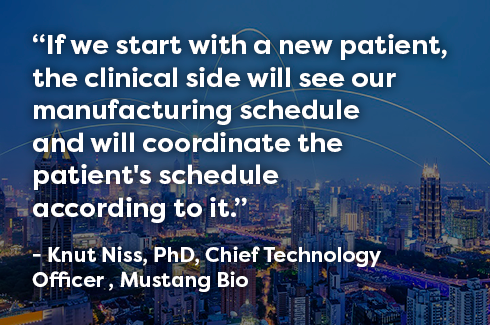Autologous cell therapy: tracking patient material with Mustang Bio

In this exclusive interview for BWB TV at Biotech Week Boston (September 2018) Knut Niss, PhD, Chief Technology Officer at Mustang Bio, explores the tracking of patient material for an autologous cell therapy, as well as the bottlenecks still facing cell and gene therapies. Dr Niss was speaking to Brandy Sargent, Editor of Cell Culture Dish.
BS: An important question in cell therapy is how you track patient information and I wanted to find out how will you do that with your autologous therapy?
KN: So the keyword you used is autologous. Autologous, just so everybody is aware, means that we track the patient from providing the starting material - in our case we do Cart T, it's T-cells - back to the infusion of the final product. So, it's very critical for us to understand where the product is at any time and that the patient matches the product that will be infused. You can imagine if you infuse the wrong product to the wrong patient, this would be a very devastating effect.
Being a small company, we contemplated using good old paper and mechanisms like that. We decided to actually implement an IT-based system called TrakCel, simply because we anticipate that we'll grow rapidly, and we have multiple assets that we want to follow. Having an IT-based system really allows us to take it out of the paper trail, the hands-on, and putting it into the Cloud and managing it from there. The system will be at the clinical side and will be at the manufacturing side.
On top of allowing us to monitor the product and the patient, we can also coordinate, which is, I think, even more critical. By coordinate, I mean that we can tie the manufacturing schedule to the clinical schedule. So, in other words, if we start with a new patient, the clinical side will see our manufacturing schedule and will coordinate the patient's schedule according to it. So, we should not run into a situation where the patient, for example, undergoes an apheresis, ships the material to us, and we will, then, not be able to manufacture because we were not aware of it and other things.
BS: And can you explain how your approach is different than others?
KN: As I said we are a very small company at this time - we have around thirty people, we're still in the start-up mode. I think many companies in our situation are not as forward looking. This IT-based system is really designed for later-stage clinical trials when you have multiple patients at the same time, commercial eventually. We decided that we want to invest early in these things simply because we anticipate that with multiple assets we will have success and we want to go through the clinical development very fast. So, rather than catching up down the line and implementing the system, we wanted to make sure that when we hit the ground running with multiple patients at the same time that it's a smooth thing. ]
That's certainly one difference. The other difference, I think, as a company is that we do our own manufacturing and that's a critical piece. We are in the autologous Cart T space - manufacturing is, if not the most critical component of the therapy, it's one of them, and we wanted to control that. Control means that we wanted to be able to control the capacity so we can manufacture products for patients when they come and not tell patients they have to wait a month because we don't have capacity. So, that certainly separates us from others.
BS: With cell and gene therapy growing so much, where do you see bottle necks coming up in the industry?
KN: I see multiple. One is what I just mentioned, the capacity of manufacturing. After we announced that we're building our own manufacturing, I see many other companies now doing the same thing. Here in this area, Rubius Therapeutics just announced a while ago a pretty significant investment, so there's an example where companies, even when they're pre-clinical, not even in clinical development, recognize that manufacturing needs to be considered in-house. And more companies follow.
The other problem I think is certainly QC [quality control]. QC is an area that, in my view, that has not been discussed enough. We always talk about cost of goods and pay attention to the process side. QC is a very heavy cost item, but it's also a capacity item. So, we need to find better ways of managing and streamlining QC assays for the large capacities.
